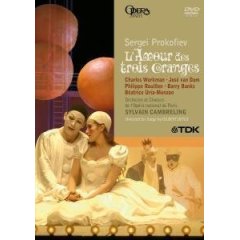|
Prokofiev – The Love for Three Oranges

The King of Clubs – Philippe Rouillon
The Prince – Charles Workman
Princess Clarice – Hannah Esther Minutillo
Leandro – Guillaume Antoine
Truffaldino – Barry Banks
Pantalon – Jean-Luc Ballestra
Tchelio – Jose van Dam
Fata Morgana – Beatrice Uria-Monzon
Three Princesses – Letitia Singleton, Natacha Constantin, Aleksandra Zamjska
The Cook – Victor van Halem
Farfarello – Jean-Sebastien Bou
Smereldina – Lucia Cirillo
Musical Director – Sylvain Cambreling
Stage Director – Gilbert Deflo
TV Director – Thomas Grimm
Sets & Costumes – William Orlandi
Lighting – Joel Hourbeigt
Choreographer – Marta Ferri
TDK – DVWW-OPORANG [1116 minutes + Bonus 30 mins; Recorded at Opera National de Paris – Bastille, December 2005]
Achieving a balance is the key to success in staging Prokofiev’s L’Amour des trois Oranges: balancing its commedia dell’ arte origins with a genre that is more familiar to modern audiences, revealing its surrealist black comedy whilst retaining the simplistic classic fairytale, above all creating a framework in which the confusingly large cast of seemingly impossible characters can establish clear identities.
Gilbert Deflo’s production succeeds pretty well on all these counts, weaving the drama in the context of a 1920’s circus - William Orlandi’s single semi-circular set makes full use of the very wide stage in the Bastille Theatre.
Deflo’s decision to guise his sickly Prince as Pierrot, one of the most familiar characters of commedia dell’ arte characters, is inspired and perfectly links to the clowns of his circus theme. Charles Workman is superb in the role, singing with admirable fluidity and clarity, bringing out the wistful pathos in a confused young man who is only too often portrayed as merely a vapid nonentity.
Philippe Rouillon is also rock solid as the aging King, (though I have reservations about his silk beard referencing to Chinese theatrical traditions), achieving a well judged balance between dignity and absurdity. Princess Clarice (Hannah Esther Minutillo), resplendent in emerald green with eyelashes to kill, and Leandro (Guillaume Antoine) suavely tailored in yellow, have all the period sophistication of a pair of conspirators that could have stepped straight from the pages of a Dornford Yates’ novel.
Truffaldino rightly emerges as the pivotal character in the plot, and Barry Banks is everywhere on stage in a roly-poly costume that emphasises his diminutive stature and a half mask which forces him into eloquent mime to portray his emotions. Jean-Luc Ballestra makes an exceptionally sweet voiced and rather whimsical Pantalon, and Jean-Sebastien Bou extracts every inch of malice from Farfarello. Victor van Halem towers as the menacing Cuisiniere, though I was puzzled to seem him armed with quite a modest looking knife whereas the text constantly refers to the dangers of his ladle.
The rival magicians, whose Act 1 card-game battle should be a high point, fail to measure up. Beatrice Uria-Monzon’s Fata Morgana has neither the strength of voice nor stage presence to summon up a presence of evil, though she is certainly not helped by a costume which brings to mind the Marianne of French nationalism. Jose van Dam as Tchelio merely looks and sounds like a tired old man in evening dress.
Those reservations aside, it is a classy looking Christmas show, very slickly choreographed, its stage filled with the large chorus, dancers and circus performers, and some spectacular fireworks and lighting effects. Sylvain Cambreling’s conducting brings out the nuances in Prokofiev’s quixotic score, and he reprises the famous March as a flourishing circus finale.
The 30 minute bonus documentary provides an informative introduction.
Serena Fenwick
|

